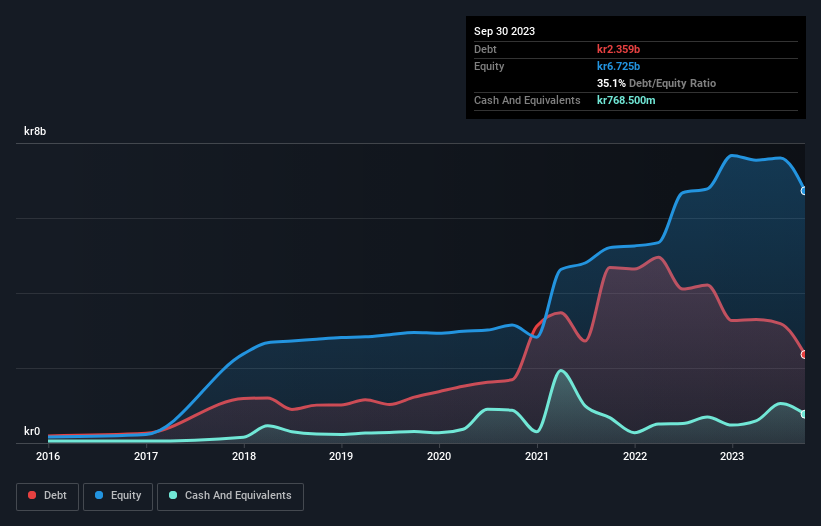David Iben put it well when he said, 'Volatility is not a risk we care about. What we care about is avoiding the permanent loss of capital.' When we think about how risky a company is, we always like to look at its use of debt, since debt overload can lead to ruin. Importantly, BHG Group AB (publ) (STO:BHG) does carry debt. But should shareholders be worried about its use of debt?
When Is Debt A Problem?
Debt and other liabilities become risky for a business when it cannot easily fulfill those obligations, either with free cash flow or by raising capital at an attractive price. If things get really bad, the lenders can take control of the business. However, a more usual (but still expensive) situation is where a company must dilute shareholders at a cheap share price simply to get debt under control. By replacing dilution, though, debt can be an extremely good tool for businesses that need capital to invest in growth at high rates of return. The first thing to do when considering how much debt a business uses is to look at its cash and debt together.
See our latest analysis for BHG Group
How Much Debt Does BHG Group Carry?
As you can see below, BHG Group had kr2.36b of debt at September 2023, down from kr4.22b a year prior. On the flip side, it has kr768.5m in cash leading to net debt of about kr1.59b.

How Healthy Is BHG Group's Balance Sheet?
The latest balance sheet data shows that BHG Group had liabilities of kr2.13b due within a year, and liabilities of kr3.36b falling due after that. Offsetting these obligations, it had cash of kr768.5m as well as receivables valued at kr640.2m due within 12 months. So its liabilities outweigh the sum of its cash and (near-term) receivables by kr4.09b.
This deficit casts a shadow over the kr2.28b company, like a colossus towering over mere mortals. So we'd watch its balance sheet closely, without a doubt. After all, BHG Group would likely require a major re-capitalisation if it had to pay its creditors today. The balance sheet is clearly the area to focus on when you are analysing debt. But it is future earnings, more than anything, that will determine BHG Group's ability to maintain a healthy balance sheet going forward. So if you're focused on the future you can check out this free report showing analyst profit forecasts.
Over 12 months, BHG Group made a loss at the EBIT level, and saw its revenue drop to kr12b, which is a fall of 9.9%. We would much prefer see growth.
Caveat Emptor
Over the last twelve months BHG Group produced an earnings before interest and tax (EBIT) loss. Indeed, it lost a very considerable kr978m at the EBIT level. Considering that alongside the liabilities mentioned above make us nervous about the company. We'd want to see some strong near-term improvements before getting too interested in the stock. It's fair to say the loss of kr1.6b didn't encourage us either; we'd like to see a profit. In the meantime, we consider the stock to be risky. The balance sheet is clearly the area to focus on when you are analysing debt. But ultimately, every company can contain risks that exist outside of the balance sheet. For example, we've discovered 1 warning sign for BHG Group that you should be aware of before investing here.
When all is said and done, sometimes its easier to focus on companies that don't even need debt. Readers can access a list of growth stocks with zero net debt 100% free, right now.
Valuation is complex, but we're here to simplify it.
Discover if BHG Group might be undervalued or overvalued with our detailed analysis, featuring fair value estimates, potential risks, dividends, insider trades, and its financial condition.
Access Free AnalysisHave feedback on this article? Concerned about the content? Get in touch with us directly. Alternatively, email editorial-team (at) simplywallst.com.
This article by Simply Wall St is general in nature. We provide commentary based on historical data and analyst forecasts only using an unbiased methodology and our articles are not intended to be financial advice. It does not constitute a recommendation to buy or sell any stock, and does not take account of your objectives, or your financial situation. We aim to bring you long-term focused analysis driven by fundamental data. Note that our analysis may not factor in the latest price-sensitive company announcements or qualitative material. Simply Wall St has no position in any stocks mentioned.
About OM:BHG
BHG Group
Operates as a consumer e-commerce company in Sweden, Finland, Denmark, Norway, rest of Europe, and internationally.
Good value with reasonable growth potential.
Similar Companies
Market Insights
Community Narratives



